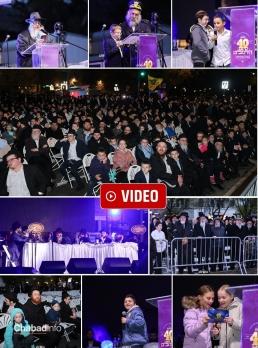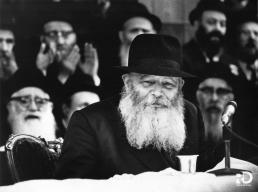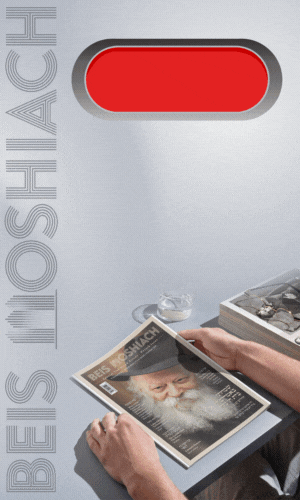Stuck in Life? Call Moshiach!
This week’s reading begins the book of Leviticus where we learn about the animal sacrifices and it opens ‘He (G-d) called (Vayikra) to Moshe, and G-d spoke to him, etc.” But strangely the first words “He called to Moshe” (Vayikra el Moshe) are apparently superfluous: It could have begun “G-d spoke”. Read the rest of this article by Rabbi Tuvia Bolton • Full Story
By Rabbi Tuvia Bolton
This week’s reading begins the book of Leviticus where we learn about the animal sacrifices and it opens ‘He (G-d) called (Vayikra) to Moshe, and G-d spoke to him, etc.” But strangely the first words “He called to Moshe” (Vayikra el Moshe) are apparently superfluous: It could have begun “G-d spoke”. Rashi explains that “Vayikra” is a term of endearment and show that G-d liked Moses.
But this also doesn’t seem to make sense. Don’t we know that G-d liked Moses? And if this was some special type of liking, then why did the Torah wait for the laws of sacrifices to tell us? Also, if you look in an actual Torah scroll, you’ll see that the last letter (Alef) of this word ‘Vayikra’ is written smaller than the other letters of the Torah. Why is this?
To answer this here is a story.
Rabbi Yissachar Ber of Rodoshitz was a great Tzadik (uniquely holy Jew) that lived in Poland some one hundred years ago. Like Moses over 3,000 years earlier, whenever possible he did all he could to ‘take the Jews from Egypt’ namely alleviate their problems.
For instance, one of the biggest problems for the Jews in Rodoshitz was burial.
Several thousand Jews lived in the town but there was no Jewish cemetery there. Whenever a Jew died, the bereaved family had to hire a carriage and travel for some two hours, often through rain, blazing sun or stormy, sub-zero weather, to the nearest town make the burial.
It wasn’t that there was no available land in Rodoshitz, there was plenty of it. The problem was the local Baron. He hated Jews passionately. The very sight of a Jew made him berserk and he made it clear that there was no way he would give them the land or anything else. In fact, the few times they approached him about making a cemetery, the Jews were punished, fined and suffered for months thereafter.
As the Jewish population there grew, the situation became unbearable until finally the town elders decided they would have to ask the Rebbe to spiritually intervene. This was no simple matter because their Rebbe was such an intensely holy person that it was very difficult to even stand in his presence.
They prepared themselves as much as possible; purified their thoughts, went to the mikveh, gave charity, spent the entire 24 hours beforehand praying, learning Torah and reading Psalms and finally entered the Rebbe’s office in fear and trepidation.
They poured out their hearts and waited in silence for the Rebbe’s reply.
“Isn’t there any plot of land that would be fitting for a cemetery here in Rodoshitz?” He asked.
“Yes” they answered sadly. “In fact, there is a perfect place; a worthless plot of rocky and barren land about fifteen minutes from the town. True, it would be hard to dig graves there but we figured that it was the only place that the Baron might be willing to sell. But when offered him money, a lot of money, he just started screaming like a madman that he didn’t want ANY Jews on his lands; dead or alive. Just that the live ones pay taxes. Then he drove us out and raised the taxes!”
The Rebbe thought for a while and said, “Go again, offer him even more money and, if he refuses, tell him in my name that if the Jews can’t be buried there then someone else will.”
They left the Tzadik’s home and courageously headed straight for the Baron’s castle without considering the consequences. They miraculously got in and even managed to tell him the Rebbe’s mysterious message before he started screaming and cursing and had them evicted. Two weeks later was the Baron’s birthday and he announced to his family he would celebrate by giving them a tour of his lands followed by a picnic.
His wife and four children, dressed in their finest clothes joyously entered his enormous royal carriage pulled by four huge white steeds, the driver cracked his whip and they were off! It was a beautiful summer day and they were thoroughly enjoying every moment, commenting on the sights and occasionally stopping to walk around or to sit by a river.
Needless to say, the local farmers turned out and waved to the carriage (more from fear than from love) and everything was going perfectly… Until the Baron devilishly announced that before the picnic they would visit the barren plot of land that he was driving the Jews crazy with.
He gave orders to the driver and in no time they were there. It was bumpy and rough going but that just added to the fun. The children were bouncing and shouting with glee. But suddenly the carriage slowed to a halt and all that could be heard was the driver shouting, cursing and whipping the horses.
“What is the problem?!” Yelled the Baron through the window.
“I don’t know.” The driver replied. “We’re stuck in some mud and the horses aren’t getting us out. They’re also stuck in whatever it is. I can’t figure it out.”
The driver got off the carriage and saw they were being delayed by a large shallow puddle of water in the road that he thought would be easy to drive through. But it turned out to be more problematic than he thought.
Although he couldn’t figure where such a puddle came from in the middle of the summer or why it stopped the carriage, suddenly he realized that he too was beginning to sink.
Meanwhile the Baron opened his door figuring he would just take his family out. But as soon as he put a foot down it sunk in the mud and it was only with the greatest effort that he (and the driver) managed to get free from the quicksand and get back to their places.
They shouted for help, the driver even blew a trumpet he had for such emergencies and in no time, farmers had gathered around and began yelling advice as the puddle seemed to grow, pushing them further and further from the carriage. A few of them ran home and brought ropes to throw as life-lines but by the time they returned, the water had spread out so that the ropes simply didn’t reach the carriage.
Others brought planks of wood but they simply sank in the mud as soon as someone stepped on them. A few farmers even set off desperately to the Castle for help, which was a good two hours’ drive.
After half an hour the wheels of the carriage were half sunk and going steadily down. The Baron’s wife and children were screaming in panic while the Baron had his head stuck out the window alternately shouting curses at the crowd for not doing anything and looking up trying to figure how to get his family onto the roof.
Finally, someone in the crowd suggested that they call the Rabbi.
When the Baron heard that he immediately shouted “NO!!”. But his weeping family gave him a change of heart. “Err. That is … YES! YES! Certainly! Good idea!! “Run! Run with all your might!” He shouted. A half an hour later when they returned with the Rebbe, the Baron, his family and the driver were sitting on the roof of the carriage, swooning; wailing and waving their arms in helpless fear while only the heads of the horses and a few feet of the carriage were jutting above the water.
“Are you willing to sell the cemetery land?” The Rebbe yelled to him.
“Yes, Yes!!” The Baron shouted back. I’ll even give it to you. Take it for free! Just get us out of here!”
“No!” Answered the Rebbe. “I want to buy it and I want you to write up the deed.”
“Good, Good!” The Baron yelled as he produced a pen and a large scrap of paper from one of his pockets, wrote what the Rebbe told him to, signed it, took off his shoe, put it inside and threw it to the Rebbe.
As soon as the Rebbe read it and was satisfied he yelled to the driver to get back in his seat and urge the horses, who were now staining to keep their necks above the mud, to move.
It seemed ridiculous, hopeless, insane! But the driver had no other choice. He got back in his seat, which was covered with water, snapped his whip and …. sure enough…it worked!! The carriage actually began to move and in moments the horses had pulled the carriage, almost completely black with mud, to freedom!
The farmers helped the Baron and his family down from the roof of the carriage and as soon as their feet hit the ground his wife was beside with gratitude to the Rebbe. She would have hugged him but his very being radiated such awesome holiness that she kept her distance.
The Baron approached the Rebbe, curtly bowed and said quietly ‘I will always be grateful to you for this. Please come to see me at my castle at your convenience and I will have all the necessary papers drawn up. You are welcome in my home’
Two days later the Rebbe visited the Baron, paid him the money and received an official deed of sale. The Baron then shook the Rebbe’s hand and said,
“I have begun to think differently about your people. I see why the Bible calls you special and chosen and holy. I mean, you could have let me and my family die, which is what I would have done to you in such a case… but you didn’t. I see I have a lot to learn from you. I have decided to change my attitude and help your people who I have so wronged. If you ever need anything please ask me’
This answers our questions. Why begin the topic of the sacrifices with ‘VaYikra’ and why is the Alef small? Vayikra shows G-d’s special love of Moses and the small alef shows why, because Moses was ‘the humblest man on earth (Num. 12:3). That’s the connection to the sacrifices.
The sacrifices are the ultimate way to serve G-d.
G-d wants us to make this physical world holy. That’s why He put us here, gave us the Torah here and wants the Holy Temple here. And ultimate way to do this is the sacrifices. Taking the blood, meat and very life of a lowly animal and converting it to being a holy commandment. That is the ultimate connection of the creation to The Creator. Something like how the physical mud, carriage and horses in our story and even the wicked Baron became testimony that the G-d of Israel is King of the World. But just as the miracle in our story couldn’t have occurred without the Rebbe of Rodoshitz so to the transforming the world required Moses.
And that is indicated by the word Vayikra and its small ‘Alef.
Moses was the humblest person in the world (hence the ‘small’ Alef) and therefore the perfect conveyor (conductor) of G-d’s will to the Jews. (Vayikra means to call forth).
That is why G-d ‘called’ him (Vayikra) endearingly because only Moses (and the Moses in every generation) can give the Jews the power and inspiration to improve and bring blessing to the entire creation. But without him they are lost.
Which is why the Two Temples were destroyed when the Jews refused to listen to their leaders and prophets.
Therefore ‘Vayikra’ is also hinting at Moshiach; a greater and even humbler leader that Moses who will inspire ALL the Jews, build the third Temple and consequently gather them all to Israel.
Because only he will awaken true Jewish identity (as do the ideas of Chassidut) and reveal G-d’s love.
It all depends on us, and not much is lacking. We are standing on the merits of thousands of years of Jewish self-sacrifice and suffering.
It could be that even one more good deed, word or even thought can tip the scales and reveal… Moshiach now!
Rabbi Tuvia Bolton
Yeshiva Ohr Tmimim
Kfar Chabad, Israel
ohrtmimim.org
43
Join ChabadInfo's News Roundup and alerts for the HOTTEST Chabad news and updates!










































